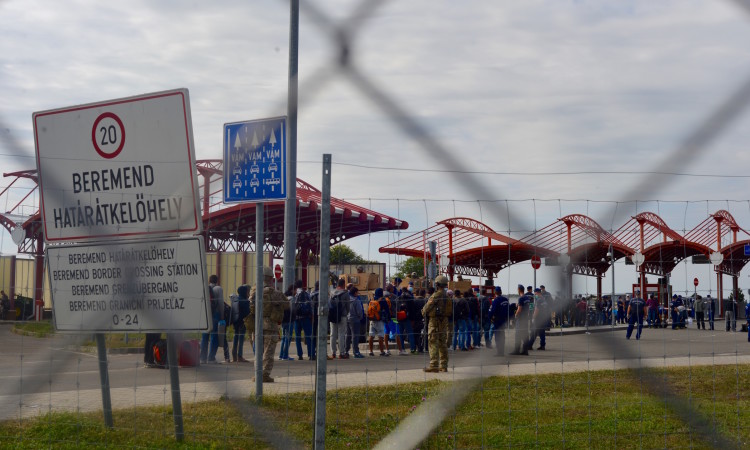BELI MANASTIR, Croatia – Buses queued up Tuesday near Beremend, a Hungarian border town. In sight, right across the border, the Hungarian army fell into formation exactly where thousands of migrants and refugees would exit the buses to cross to the other side on foot. On the army’s side, it looked like a war was just about to start. The soldiers wore army desert tactical vests, helmets, and backpacks dangling with deadly gadgets. They had arrived in three military Humvees equipped with mounted guns. They waited.
At the same time, crews of Hungarian workers worked their way close, stringing out a razor wire fence to block any migrant trying to outflank the Hungarian army unit. From the buses, migrants could hear the dreadful and claustrophobic sound of nails being hammered nonstop into concrete blocks. They listened to the trap being built for them.

Men, women, and children waiting on the buses could only have been dreading this moment, when they would have to enter Hungary before trekking northward to Austria and Germany. Since the refugee crisis began, Viktor Orban, the Hungarian prime minister, has made it clear they were not welcome in Hungary. But they knew nothing about the armed military reception they saw out the bus windows. The landscape before them looked like the landscapes of the war they had fled weeks before.
A group of five Syrian friends, taking a break outside of one of the buses, asked: “The army?”. . . “What now?”. . . “Will they keep us in Hungary?”. . . “Can they attack us?” . . . “Please, tell us what you know.”
A new, tougher law restricting migrants and refugees had been rushed through the Hungarian Parliament on Monday. It granted the armed forces more powers to stop the refugees and migrants at its borders, and allowed them to use “non-lethal force.” Now, the army can shoot rubber bullets and tear gas grenades at unarmed people escaping war zones.
The whole group stood silent. They looked at each other and they stared at the ground. “I’m really afraid,” said Audi Baraka, a 25-year-old from Damascus, who dreams about London. “I just want to go there. Back home I have nothing. No peace. No water. Nothing. But maybe I won’t be able to go.” He rubbed his hands against his eyes as if to force himself to stay awake.
Amnesty International has condemned the new law, accusing Hungary of “violating the human rights of refugees by blocking their access to a meaningful asylum procedure on its territory.”
The European Union has kept silent about this.
On the Croatian side, one of the bus drivers called me to his side and said, “Please don’t tell them about what’s happening in Hungary. They’ll panic.” I asked him why I should not share that information. “Those are the rules we have,” he said.
Nothing now can lessen the refugees’ terror about crossing through Hungary. The hardships to come had been a frequent topic in the makeshift camps on the Croatian side of the border.
In the line of buses with the next group setting out, Suvan, a 28-year-old Iraqi who said he used to work as a translator with the US Army, said he had fled his country after ISIS had threatened to kill him, and had killed his brother. They’d found out he had worked “for the Americans.”
“I don’t know where I’m going,” he said, minutes before his bus lurched forward to drop him in Hungary. “I’m probably gonna go have my fingers scanned. Maybe I’m going to jail,” he said. He dreaded tough times ahead.





